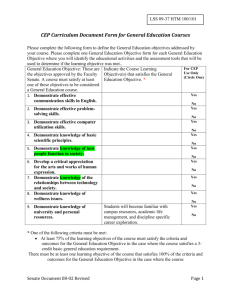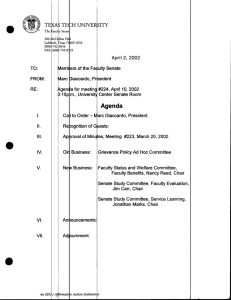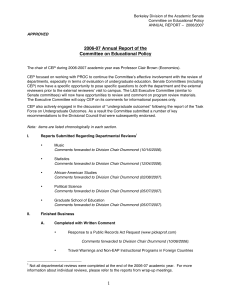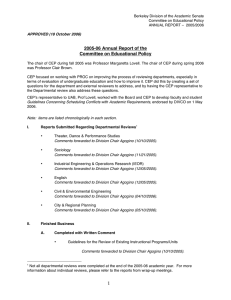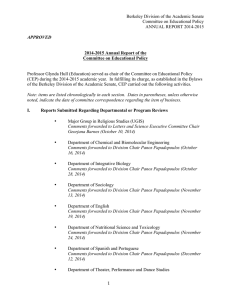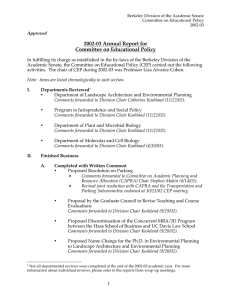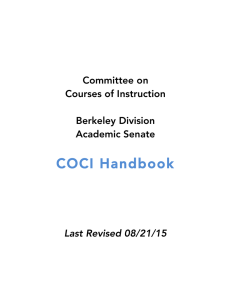January 22, 2010 HENRY POWELL Chair, Academic Council
advertisement
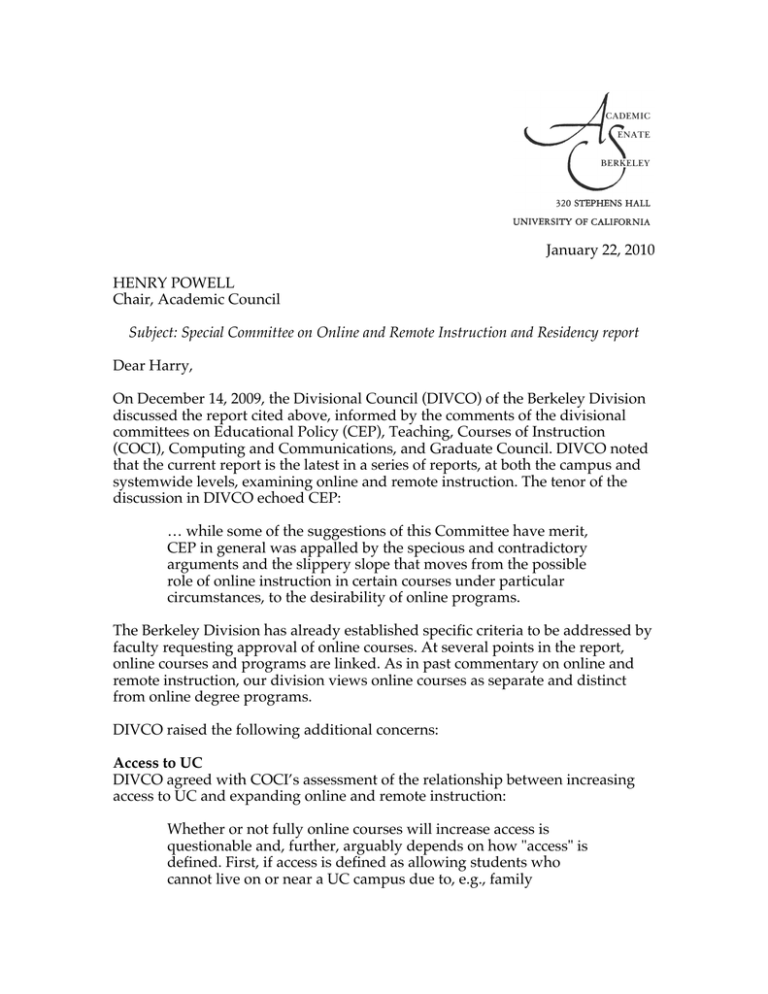
January 22, 2010 HENRY POWELL Chair, Academic Council Subject: Special Committee on Online and Remote Instruction and Residency report Dear Harry, On December 14, 2009, the Divisional Council (DIVCO) of the Berkeley Division discussed the report cited above, informed by the comments of the divisional committees on Educational Policy (CEP), Teaching, Courses of Instruction (COCI), Computing and Communications, and Graduate Council. DIVCO noted that the current report is the latest in a series of reports, at both the campus and systemwide levels, examining online and remote instruction. The tenor of the discussion in DIVCO echoed CEP: … while some of the suggestions of this Committee have merit, CEP in general was appalled by the specious and contradictory arguments and the slippery slope that moves from the possible role of online instruction in certain courses under particular circumstances, to the desirability of online programs. The Berkeley Division has already established specific criteria to be addressed by faculty requesting approval of online courses. At several points in the report, online courses and programs are linked. As in past commentary on online and remote instruction, our division views online courses as separate and distinct from online degree programs. DIVCO raised the following additional concerns: Access to UC DIVCO agreed with COCI’s assessment of the relationship between increasing access to UC and expanding online and remote instruction: Whether or not fully online courses will increase access is questionable and, further, arguably depends on how "access" is defined. First, if access is defined as allowing students who cannot live on or near a UC campus due to, e.g., family obligations, then online UC courses may help them. Second, if access is defined as continuing to allow all of the 12.5% of California high school graduates to be enrolled in a UC who wish to do so, then that depends on both state support and believing the premise that online courses will somehow provide an efficiency of scale in that more students can be educated for less money. Again, we are not convinced of that model, as noted above, and believe that the body of evidence so far directly contradicts this notion. Third, if "access" is defined as maintaining access to a UC education for more socioeconomically disadvantaged Californians, then online courses at least as currently imagined may be a poor substitute for traditional face-to-face courses. For example, it is wellestablished that academically well-prepared students with wellestablished study skills do well in "correspondence" or "selfpaced" courses, in ways somewhat analogous to fully online courses today. Some committee members are concerned that students who are less well-prepared academically will be exactly the students who are most likely to fail to benefit from fully online courses. Residency With respect to residency, the discussion in DIVCO highlighted the key points raised by Graduate Council: Members thought that residency in an online educational context should mean that students participate in Berkeley’s academic life, although this can be measured differently than it is currently. Members recognize that the existing definition of residency was once a useful tool to measure the participation of students in the academic community, but that the definition no longer matches its intended purpose. We suggest that the regulation be revised to define residency using measures of active face-to-face participation in a program’s activities. We place a high value on a variety of in-person interactions, including structured ones between students and their peers, faculty, participation in professional conferences, and casual interactions as occur in the library and the local coffee shops. Members believe strongly that in-person mentoring and peer interactions are particularly important and cannot be substituted by online mechanisms. For these reasons, members concluded that any degree involving a research and a thesis should be primarily one that involves in person contacts and builds a scholarly community on a campus. Academic freedom DIVCO rejected any link between the development of online courses and programs, and principles of academic freedom. It endorsed CEP’s position: We were particularly offended by their adoption of the mantle of academic freedom: “The faculty’s authority to develop and implement new approaches to instruction lies within the mandate of academic freedom.” Several members of CEP were involved with the adoption of the new Code of Academic Freedom in APM 10, and there is nothing in APM 10 that can be construed as authorizing an individual’s development of online courses and curricula. On the contrary, “Academic freedom requires that the Academic Senate be given primary responsibility for applying academic standards, . . . and that the Academic Senate exercise its responsibility in full compliance with applicable standards of professional care.” In sum, the Berkeley Division takes seriously its responsibility for the oversight of courses and curricula. We are supportive of further exploration of online educational media. But we expect that future bodies generating recommendations on online and remote instruction will begin their consideration with how best to improve student learning and satisfaction, along with improving efficiency and achieving cost-savings. Further, DIVCO hopes that such recommendations will take into account the entire spectrum of technologymediated instruction, including hybrid approaches that blend traditional classroom and online instruction. Both CEP and COCI provided recommendation-by-recommendation commentary on the report. We are happy to provide their comments if that would be helpful to Academic Council. Sincerely, Christopher Kutz Chair, Berkeley Division of the Academic Senate Professor of Law, Jurisprudence and Social Justice Program Cc: Ignacio Navarrete, Chair, Committee on Educational Policy Kristie Boering, Chair, Committee on Courses of Instruction Anthony D. Joseph, Co-chair, Committee on Computing and Communications Katherine Yelick, Co-chair, Committee on Computing and Communications Ronald Cohen, Chair, Graduate Council Jill Stoner, Chair, Committee on Teaching Linda Song, Associate Director staffing Graduate Council Sumei Quiggle, Senate Analyst, Committee on Courses of Instruction Diane Sprouse, Senate Analyst, Committee on Computing and Communications Robert Schlick, Committee on Teaching
